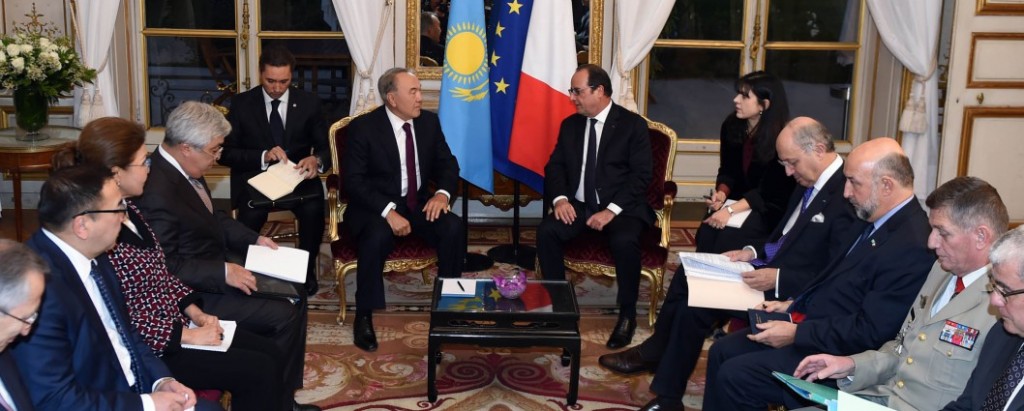Kazakh President Nursultan Nazarbayev paid an official visit to France Nov. 5-6 to meet French President François Hollande and hold talks with representatives of French business and political circles, as well as participate in the 38th session of the United Nations Educational, Scientific and Cultural Organisation (UNESCO) General Conference.

President of Kazakhstan Nursultan Nazarbayev (L) meets President of France François Hollande in Paris with their respective delegations.
Nazarbayev and Hollande discussed the main directions of bilateral cooperation and exchanged views on current international issues. Nazarbayev stressed that Astana and Paris currently have great potential for cooperation in trade, economic, investment, cultural and humanitarian spheres, as well as the aerospace industry.
On behalf of Kazakhstan, Nazarbayev awarded Hollande the state award of the Order of Dostyk (Order of Friendship) of the first degree.
Following the talks, the sides adopted a presidential joint declaration, as well as a joint declaration of the Kazakh Ministry of Education and Science and the French Ministry of Higher Education and Science.
The parties also signed an agreement confirming France’s participation in the international specialised exhibition EXPO 2017 in Astana. The two sides also adopted a declaration of intention to cooperate in space between the Aerospace Committee of the Kazakh Ministry of Investment and Development and the French National Centre of Space Research.
Speaking before the heads of major French companies, the Kazakh President underlined existing trade, economic and investment cooperation between the two countries.
“Twenty-four French companies have already implemented projects in Kazakhstan worth more than $2 billion; 14 projects are in process and 10 are planned to be implemented in the long term. In the framework of my visit, contracts worth more than $5 billion will be signed,” Nazarbayev said.
“France is among the leading economic partners of Kazakhstan. In spite of the difficult external conditions, our mutual trade turnover in recent years remains at $6 billion. Over the last decade, French business investment in our economy amounted to about $12 billion. One-hundred and thirty French companies are operating in various industries of Kazakhstan’s market,” he added.
The head of state mentioned successful joint companies such as Alstom Transport, Eurocopter, PeugeotCitroën and Danone. In cooperation with Airbus Defence and Space, he noted Kazakhstan has launched two satellites for Earth remote sensing and plans to complete the construction of a spacecraft assembly and testing complex.
Nazarbayev noted the positive impact of opening direct flights between Astana and Paris for investment cooperation between the two countries, which took place in March 2015, as well as the introduction of a visa-free regime for short term visits for for French citizens as of July 2014.
He mentioned that contracts are being prepared between the two countries’ business circles covering important areas such as the supply of uranium to France, the automobile industry, water supply and waste disposal.
Nazarbayev also highlighted Kazakhstan’s work on improving the investment climate and implementing five institutional reforms, the 100 Step Plan of the Nation and Nurly Zhol programme, as well as preparing for EXPO 2017.
The Kazakh President invited French businesses to actively participate in his country’s industrialisation and planned privatisation of large enterprises, as well as in the work of the planned Astana International Financial Centre.
In turn, French company leaders praised the ongoing policy for building a favourable investment climate in Kazakhstan, noting the country has established itself as a reliable partner.
The event was attended by representatives of companies such as Airbus, Alstom Transport, Areva, the Rothschild Group, Soufflet, Veolia Asia and Vicat.
Nazarbayev held separate meetings with PSA Peugeot Citroën Chairman Carlos Tavares, Total CEO Patrick Pouyanné, Aubert & Duval President Georges Duval and economist Jacques Attali.
Nazarbayev spent his second day in France attending the 38th session of the UNESCO General Conference.
“Kazakhstan supports efforts to improve UNESCO’s efficiency and to strengthen its credibility, modernisation and adaptation to the challenges of our time. I am confident that UNESCO will continue to be an effective forum for cooperation between states and nations to promote enlightenment, understanding and peace,” he said.
Addressing the gathering, Nazarbayev proposed establishing an international academy under UNESCO on maintaining peace and sustainable development.
“Basing it on best international practices, this academy could develop progressive ideas and practical measures to maintain peace and ensure sustainable development,” he said. “Of particular importance is the search for ways of early conflict prevention through the implementation of the UNESCO Culture of Peace Concept.”
Nazarbayev also mentioned his nation’s international initiatives, such as the 2045 Global Strategic Initiative Plan (a global strategy to eliminate the root causes of wars and conflicts), the Universal Declaration on the Achievement of a Nuclear-Weapons-Free World, which is currently making its way through the UN General Assembly, and a common global network for addressing international terrorism and extremism under the auspices of the UN.
